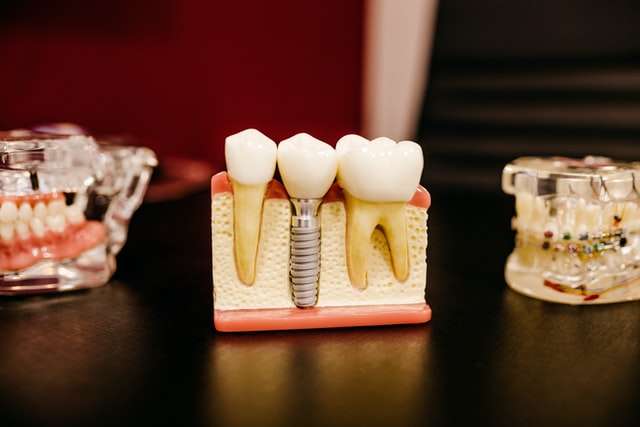Losing a tooth can cause myriad other problems for your mouth. Adjacent teeth can get infected, this infection can spread, and you can even lose bone in your jaw. Due to these dangers, receiving a dental implant or denture is an excellent step to help protect your teeth and allow you to continue using your mouth. This article will explore the differences and comparative advantages of dental implants and dentures for individuals hoping to keep a clean and functional mouth.
What Are Dental Implants?
Dental implants restore both the root and the tooth, making them the most natural tooth replacement option. Technically speaking, dental implants are titanium posts with a false tooth (or teeth) attached to the top. During a dental implant procedure, the dentist will embed the implant into the patient’s jawbone to create a strong, lasting replacement for a missing tooth. Because the root of the tooth is the grounding of the tooth, dental implants provide the same level of strength and security as actual teeth. The dental implant process is secure and provides the most stable results.
How Do Dental Implants Work?
When you need dental implants, your dentist will first create a bone graft. A bone graft is placed during the first surgical appointment, then given time to heal. Your dentist will set a temporary tooth while waiting for the implant of the real tooth. After the bone graft heals, a dentist or oral surgeon will set a sprue to drill the implant into place. Your gums typically need 3-6 months to heal before placing the permanent dental implant. Getting a tooth implant will help strengthen your jaw and other teeth and should last a lifetime.
What Are Dentures?
Dentures are another way of replacing lost teeth. Dentures can be taken in and out of your mouth, rather than being permanently fixed. There are two main types of dentures: full and partial. Your dentist will recommend which type of denture is appropriate based on your level of tooth loss. Dentures take some time to get used to and will never feel the same as natural teeth. However, today’s dentures are more natural-looking and comfortable than in the past.
How Do Dentures Work?
With full dentures, a flesh-colored acrylic base fits over your gums. The base will cover the palate or roof of your mouth when fitted for the top. Lower dentures are shaped more like a horseshoe to accommodate your tongue. Dentures are custom-made from impressions of your mouth. Dentures typically last 5-7 years and need regular adjustments to fit the changing needs of an individual’s mouth.
What’s Better?
While dental implants require a more invasive procedure to replace the tooth, they last a lifetime and feel more like natural teeth. Implants help preserve the health of adjacent teeth and prevent bone loss in the jaw. Dentures involve a simpler procedure but need regular adjustments and can accelerate the loss of teeth due to bacteria build-up. Dental implants are a more reliable and secure tooth replacement alternative depending on your situation.
If you’re interested in replacing lost teeth, find a dentist who does dental implants and dentures to receive a consultation. During this consultation, the dentist can make a recommendation based on your individual needs. It is crucial to find a dentist specializing in implants to get the proper care and attention.



